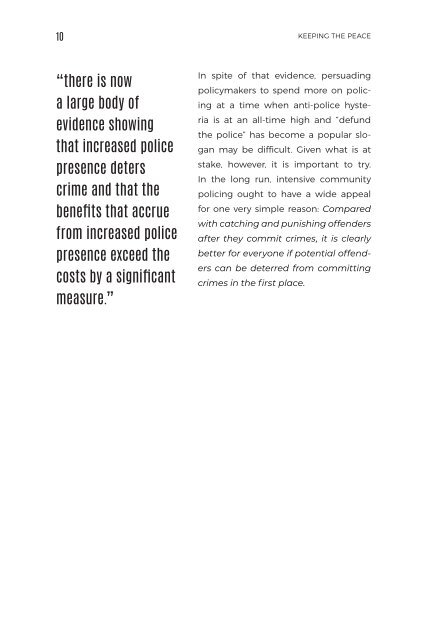Keeping the Peace Through Intensive Community Policing
As crime soars and the breakdown of public order takes its toll on our country, analysis from the John Locke Foundation signals it’s time to adopt a different approach to crime control, one that shifts the focus further upstream, looking at prevention models, rather than exclusively on punitive measures. In this July 2021 report, John Locke Foundation researcher and author Jon Guze explains that the current focus of catching, convicting, and punishing perpetrators after crimes have been committed has come with enormous economic and social costs. However, intensive community policing has proven successful at deterring crime and maintaining order, which leads to safer communities and fewer people living in poverty. Guze recommends a four-pronged plan to move forward with community policing: (1) hire more police officers (2) increase the pay for police officers (3) arm police officers with state-of-the-art training, direction, and support (4) deploy police officers as “peacekeepers” in communities that suffer most from crime and disorder.
As crime soars and the breakdown of public order takes its toll on our country, analysis from the John Locke Foundation signals it’s time to adopt a different approach to crime control, one that shifts the focus further upstream, looking at prevention models, rather than exclusively on punitive measures. In this July 2021 report, John Locke Foundation researcher and author Jon Guze explains that the current focus of catching, convicting, and punishing perpetrators after crimes have been committed has come with enormous economic and social costs.
However, intensive community policing has proven successful at deterring crime and maintaining order, which leads to safer communities and fewer people living in poverty. Guze recommends a four-pronged plan to move forward with community policing:
(1) hire more police officers
(2) increase the pay for police officers
(3) arm police officers with state-of-the-art training, direction, and support
(4) deploy police officers as “peacekeepers” in communities that suffer most from crime and disorder.
You also want an ePaper? Increase the reach of your titles
YUMPU automatically turns print PDFs into web optimized ePapers that Google loves.
10 KEEPING THE PEACE<br />
“<strong>the</strong>re is now<br />
a large body of<br />
evidence showing<br />
that increased police<br />
presence deters<br />
crime and that <strong>the</strong><br />
benefits that accrue<br />
from increased police<br />
presence exceed <strong>the</strong><br />
costs by a significant<br />
measure.”<br />
In spite of that evidence, persuading<br />
policymakers to spend more on policing<br />
at a time when anti-police hysteria<br />
is at an all-time high and “defund<br />
<strong>the</strong> police” has become a popular slogan<br />
may be difficult. Given what is at<br />
stake, however, it is important to try.<br />
In <strong>the</strong> long run, intensive community<br />
policing ought to have a wide appeal<br />
for one very simple reason: Compared<br />
with catching and punishing offenders<br />
after <strong>the</strong>y commit crimes, it is clearly<br />
better for everyone if potential offenders<br />
can be deterred from committing<br />
crimes in <strong>the</strong> first place.











